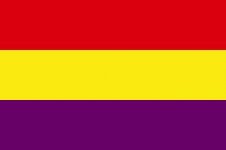The Civil War was quite divisive as most are, maybe more so. If you asked me which was worse, ours or the Spanish Civil War, that would be difficult to say.
The atrocities on both in the Spanish Civil War were terrible and thousands upon thousands fled the country into France and Latin America after the Civil War. As an aside, in the 1970s, when I came back on vacation, a family friend who had done business with my father invited me to visit in Barcelona (my parents were now living in Madrid). As his children, who were my age, were sometimes busy (school, jobs, etc.), Mr. Ribas and I had plenty of time to talk as he knew I was interested in the Spanish Civil War. Mr. Ribas was conservative and very Catholic and had been a teenager in Barcelona during the war. Barcelona was under the control of the leftists, particularly the Anarcho-Syndicalists and if you were conservative, you had to be careful or you could wind up dead. He told me that he witnessed leftists going to the church yard, digging up corpses and shooting them. He said the enmity, the division between the classes was that bad and he hoped he would never see anything like that again. It was horrific.
However, as things got a little better in the late 60s some came back. When I was in high school in Barcelona in the late 60s, two of my best friends, later girlfriends (that's another story), were Maria and Teresa PiSunyer, whose family moved to Mexico in 1939 but had decided to return.
I think if you asked most Spaniards, especially the younger generation, they will see the Republicans as the good guys.
I would be hard pressed to see the Franco side (who represented reaction, the Church, the military and the moneyed interests) as good guys. All the groups aligned with the right wanted to keep the workers the peasants and the liberals down and not allowe them to taste some freedom. The right felt threatened by the left and there was not too much accomodation, electoral politics was brutal and divisive and it didn't much to get the conflagration going. The match was the murder by the leftists of Calvo Sotelo, a rightist deputy. They took him for a "paseo" (a drive) and the rightists decided they had to take matters into their own hands, resulting in a large part of the military starting the rebellion on July 18, with Franco as its leader.
 A group of Republican soldiers in the rear of the front lines.
A group of Republican soldiers in the rear of the front lines. 



![Flag_of_the_Second_Spanish_Republic[2].png](/data/attachments/42/42368-ff1ffd0eb2ac1ae2577befd79edbb9a2.jpg)